By Sheeva Azma
Disclosure: Fancy Comma, LLC has affiliate partnerships to support its blog content. We may earn commissions for products purchased via affiliate links.
I hosted @RealScientists on Twitter from Saturday, November 20 to Saturday, November 28. I spent the week chatting with its 90,000 followers about science, science communication (also called SciComm), and science policy (often abbreviated as SciPol).
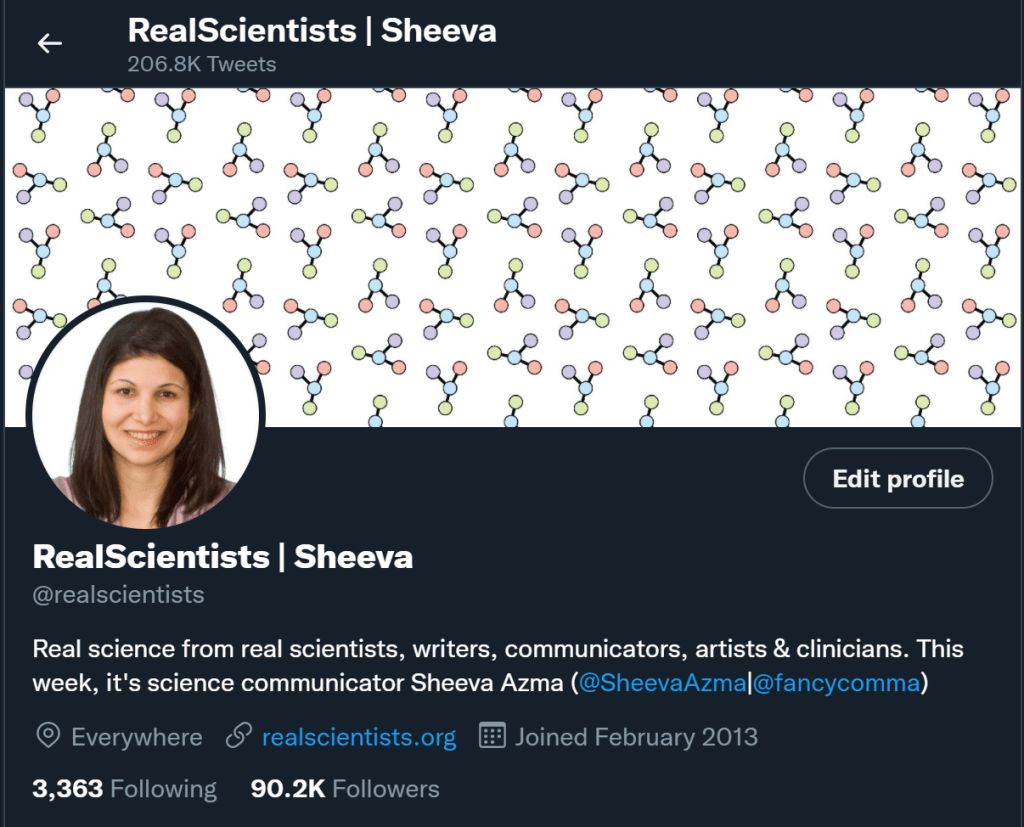
@RealScientists is a science RoCur (short for “rotating curator”) account, which means that a different person tweets there each week. The account has about 90,000 followers. Here’s an interview with me on the RealScientists blog previewing my Twitter takeover.
I learned a lot about social media management tweeting from @RealScientists for a week, and chatting with 90,000 science- and #SciComm-minded Tweeps. Here’s a recap of my week. #MarketingTwitter
Tweet
I’m no stranger to RoCur accounts — I’ve previously hosted @IAmSciComm, which, at the time, had about 30,000 followers. While I was daunted by the prospect of talking to 90,000 people, it was also an amazing opportunity to raise awareness about the importance of science communication and science policy, especially in a pandemic. Was it easy? No. Did it help to prepare? Yes, preparation was key.
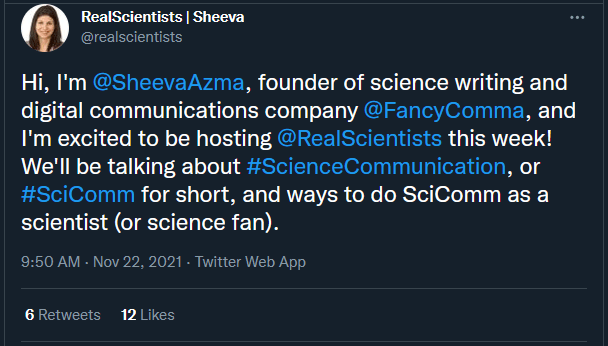
Throughout the week, I tweeted insights about science communication and science policy, and reached out to various members of the scientific and political communities.
My Strategy for Hosting @RealScientists
I started with a simple goal for the week: to get people thinking about science communication and science policy. I would begin @RealScientists prepared with a stack of Tweets, while also participating in impromptu discussions here and there.
I viewed the week as a global conversation on the many ways that science touches everything around us. By the end of the week, news broke of the COVID-19 omicron variant. It was an opportunity to remind my audience about the importance of SciComm in such times when the science is ever-changing.
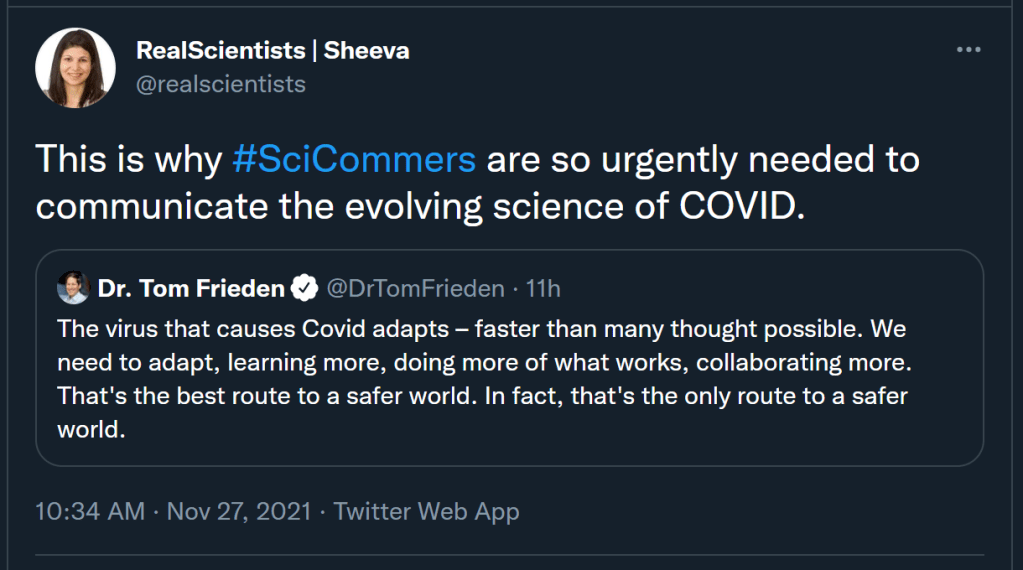
At the same time, I wanted to celebrate science, a very cool and interesting subject that unites all of @RealScientists’ followers, whether they are scientists or science aficionados.
I approached this week with an open mind. Previously, when I had planned out tons of tweets, that didn’t go well. What did go well was going with the flow, learning about my audience, and tweeting with them in mind. To my surprise, I was in a weeklong discussion of the importance of science with professors, graduate students, science journalists, even members of Congress. At times, I was simply reading the @RealScientists twitter feed (it is very entertaining), responding to people and engaging them in a lighthearted discussion.
Sometimes I just retweeted cute cat photos.
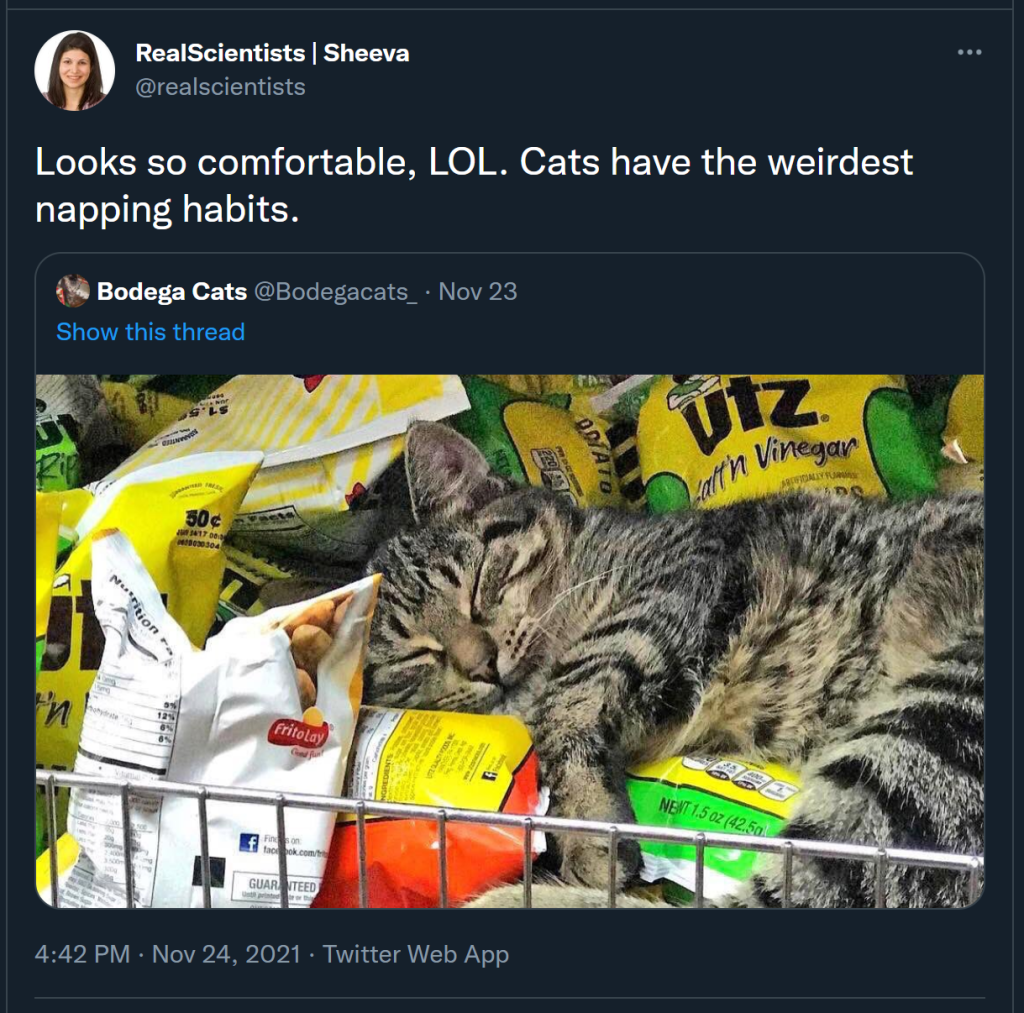
I spent a lot of my time that week over at @RealScientists. I didn’t expect managing the account to be so time-consuming, but it was due to the fact that interacting with the RS community is tons of fun. They are a friendly bunch, and the fact that they all love science means that we have something in common.
Answering the question: “What is science communication and why should I care about it?”
I tweeted a lot about the importance of science policy and science communication. I wrote these tweets beforehand, and scheduled them throughout the week:
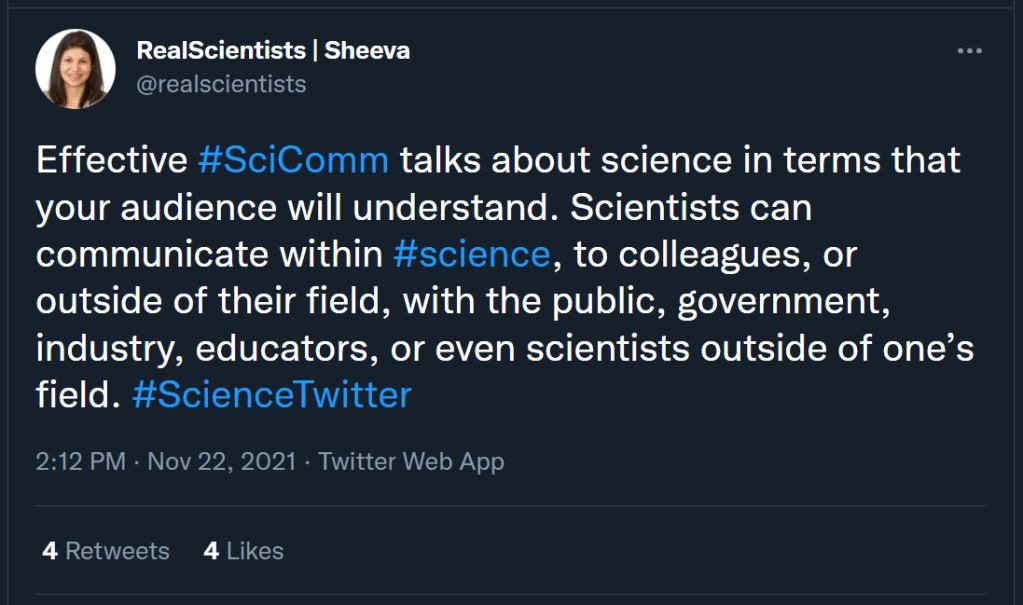
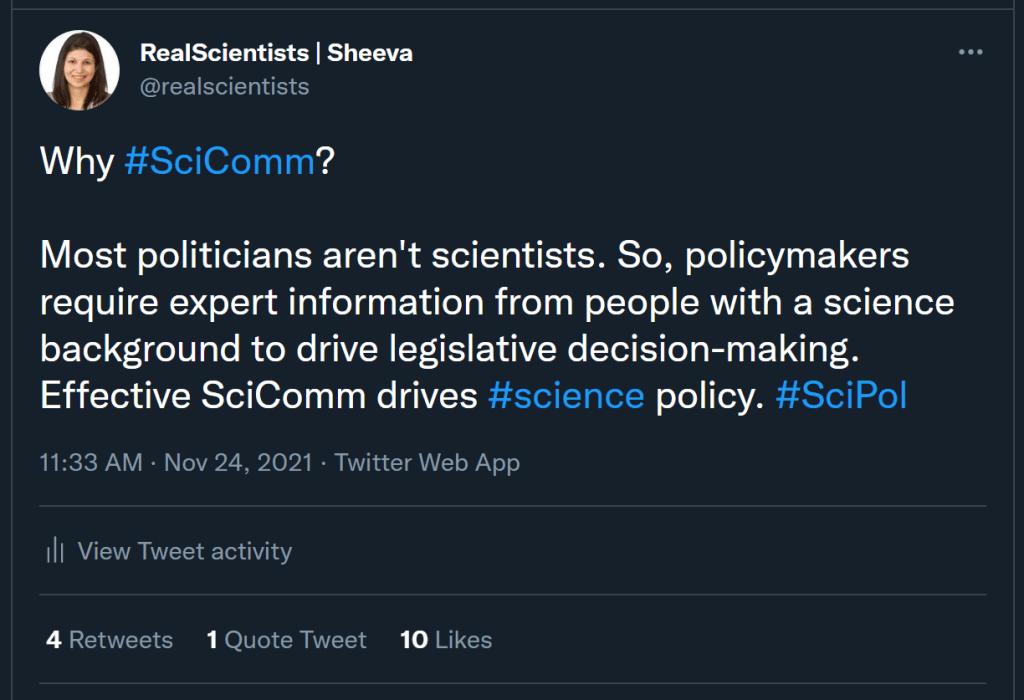

I also used the opportunity to promote our blog post about scientific jargon making science more inaccessible:

Throughout the week, I shared other blogs we’ve written to help people get into SciComm or answer SciComm questions. I also chatted with scientists about effective SciComm teaching methods that can easily mesh well with science curricula:

Amplifying Science’s Role in U.S. Policy
Beyond discussing the importance of science communication, I also wanted to shine a light on science policy. I went through CSPAN’s list of all Members of Congress on Twitter to point out some policy areas where scientists could help drive sound policies:
Topics such as disaster management…

… as well as technology policy: in this case, investing in the semiconductor industry to ramp up chip production in a shortage:
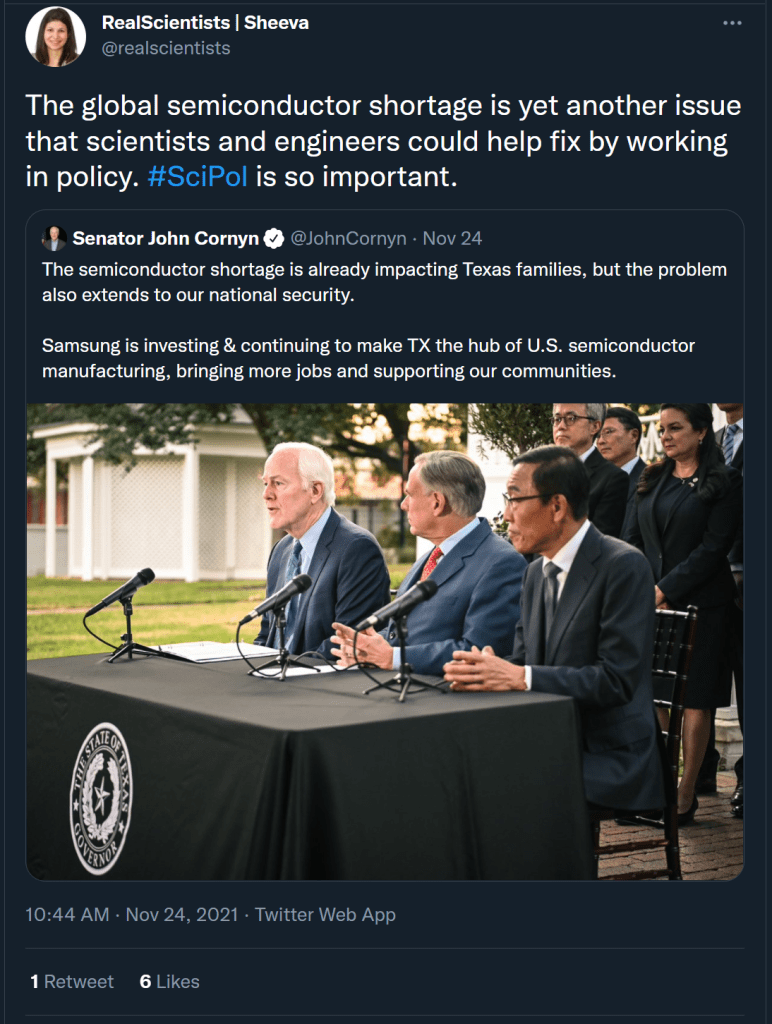
Learning and Growing from Interacting with the @RealScientists Community
I learned a lot tweeting with the @RealScientists followers.
For one thing, I learned that Reddit was built not too far from me when I was an MIT student:

Beyond that, I benefitted from the diverse perspectives and experiences of my followers, who would often chime in to discuss the day’s happenings, or their perspectives on science, SciComm, and science policy.
Tweeting with Members of Congress
I tweeted about my favorite politicians that embrace science issues:


My tweets got noticed by my favorite policymakers. Both Representatives Khanna and Massie favorited this tweet! Rep. Khanna followed @RealScientists, too!

Rep. Khanna retweeted me.

The next day, I noticed that Rep. Krishnamoorthi also followed me! So, by the end of the week, I was tweeting with some of the most pro-science members of Congress.

Having Fun
My tweets weren’t all instructive and packed with information. What’s the fun in that?
I sought to catch Kim Kardashian in discussion to no avail:

I also shared some science art:
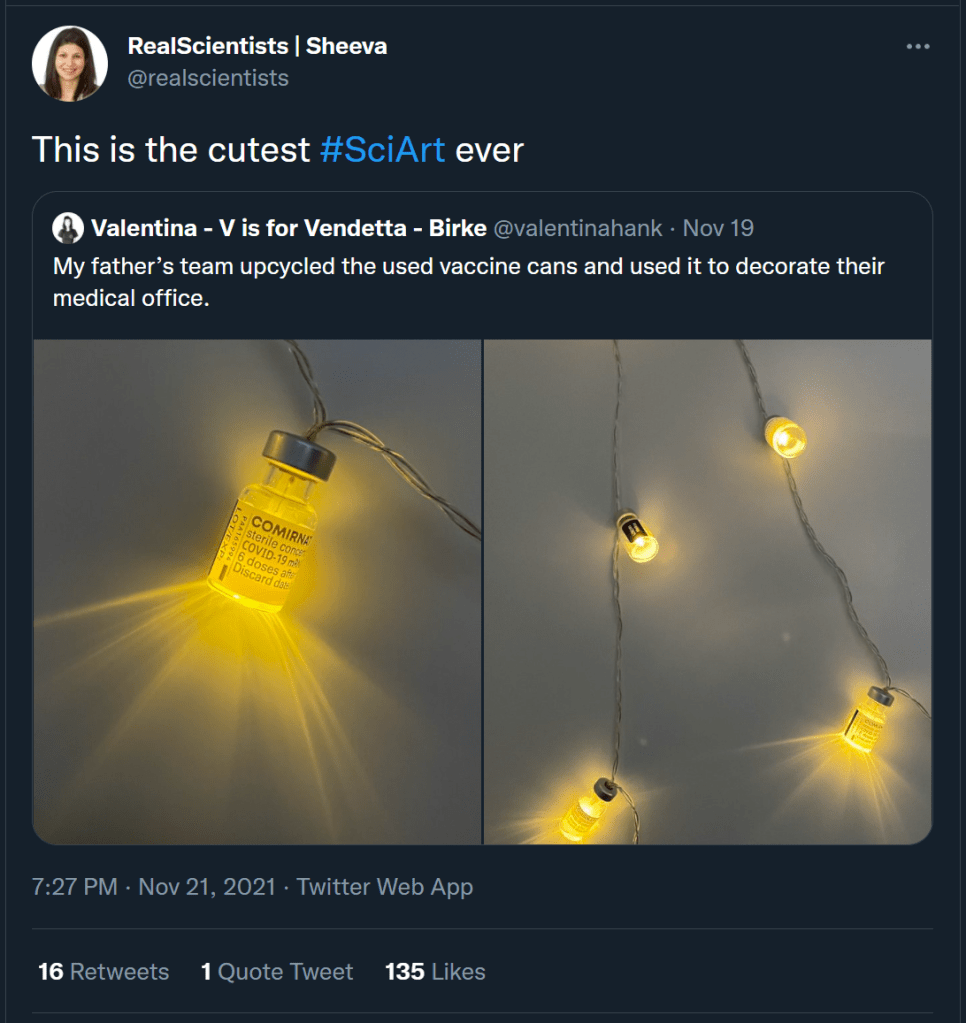
Promoting my Book
I took Thanksgiving day off, and returned Friday to continue tweeting. On Saturday, I tweeted about a promo for my book about getting into freelance science writing. It scaled the Amazon Kindle free eBook charts, reaching #1 in “Journalism Writing Reference,” #2 in “Communication Reference, and #3 in “Academic and Commercial Writing Reference” by the end of the day.

42 people snagged a free copy of the book in one day!

Analyzing the Twitter Stats
Looking at the Twitter analytics, it’s clear that I made an impact. Even though I took a whole day off due to the holiday, and only checked in a few times Friday and Saturday, the engagement statistics tell a story of high engagement and interest. Check out this graph of my ‘impressions’ (the number of times my tweets have been seen) on Twitter. For reference, my tweets start at the to the right of the line marked “Nov 21” — the rightmost fourth of the graph.

My tweets were viewed over 612,000 times:

What I Learned from Hosting RealScientists
I didn’t approach @RealScientists as a learning experience, though I ended up learning a lot. I saw it more as an opportunity to practice the social media skills I have learned over the past almost two years, running Fancy Comma’s socials and being a two-time host of @IAmSciComm.
I used all the tricks I had in my bag, so to speak, to boost engagement and develop a sense of community. Despite this, it’s difficult to know how much my tweets resonated. Does a high number of retweets, likes, and views translate to meaningful action to improve science communication and involve scientists in the political process? There are a lot of people out there, like me (sometimes), who prefer to ‘lurk’ and read tweets without engaging.
Hosting @RealScientists was a great opportunity to both talk about the importance of science communication in a pandemic, and to illuminate the many ways scientists can contribute to policymaking. Overall, I was pleasantly surprised by the experience. I thought the @RealScientists community would scoff at my efforts to shine a light on the communication of science. Writing and talking about science was a huge part of my own graduate school experience, though it was rarely taught as such. So, I was surprised to learn that my followers were as excited about science communication and science writing as I am! The best part of hosting @RealScientists was getting to chat with like-minded people who not only love science, but love to talk about science (and ways to communicate it)!
It was a great week, and I feel lucky that I was able to spend it with some friendly, science-minded Tweeps from all over the world.
2 thoughts on “Recap: Tweeting @RealScientists for a Week”